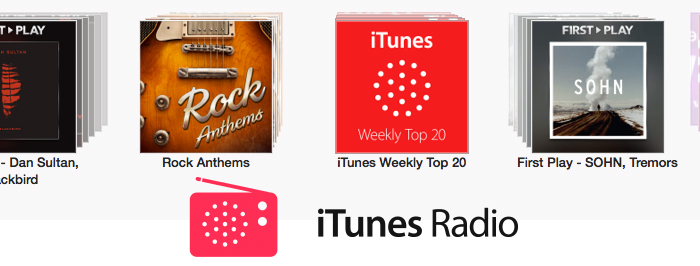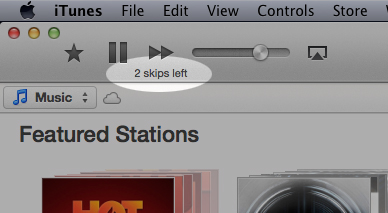Last week, I listened to Jared Leto from Thirty Seconds to Mars talk about his hometown of Los Angeles. He talked about, and then played, the songs that remind him of the City of Angels and other songs that have inspired him as a musical artist. It was great to listen to, not just as a big fan of Thirty Seconds to Mars but as someone who has just spent over two months living, studying, and working in Los Angeles.
So where did I listen to Leto and these songs? iTunes Radio.
The idea of getting artists to ‘guest host’ and create their own playlists of songs and then intermittently explain their choices is not a unique one. Traditional radio stations and music video shows have done this for decades. But to the best of my knowledge, this is the first time it has truly been brought into the 21st century and introduced to a generation of a music listeners that have grown up never knowing life without the Internet.
Apple also has the huge advantage of being the world’s biggest music store and has the ability to attract the world’s biggest stars to create their own ‘stations’ (they did, after all, get Beyoncé to launch a new album exclusively on iTunes). This advantage leads me to iTunes First Play: it initially debuted on the iTunes Store but is now a dedicated station in iTunes Radio, meaning it is easier to access and more prominent to users. I’m sure I’m not the only one that enjoys listening to new albums with the knowledge that it is so new that it isn’t even available to purchase yet.
Hampered by Limitations and Frustrations
Unfortunately, that is where my praise and iTunes Radio’s innovations stop. I’ve certainly been using it a lot, but I keep going back to Rdio because of iTunes Radio’s bizarre limitations and frustrations. At the top of the list is the mind-boggling decision to limit users to 6 song skips per hour – regardless of whether or not you are a paying member of iTunes Match. Sure, that limitation can be side-stepped by setting up multiple similar stations (Alternative Radio and Alt-Pop Radio, for example), but then you run into the issue of songs being repeated too often. Besides, why should I need to create and switch between stations if I don’t want to hear some songs?
In a similar vein, tough luck if you want to replay a song immediately, let alone seek back 30 seconds to the chorus. Or maybe you accidentally forgot to pause iTunes Radio, left the room, and now want to go back two songs so you can hear them – well, sorry, but you can’t.
I also need to take issue with the singular focus of ‘stations’. I actually really like the idea and think it does a better job at creating ‘playlists’ of similar songs I might like than Rdio does. But, everything in iTunes Radio is about stations and it becomes frustrating when I just want to listen songs or albums from Birdy, not a similar song from Missy Higgins – hence my repeated returns to Rdio.
It all seems like a compromise
I find a lot of the choices Apple made in iTunes Radio to be really peculiar, particularly those I’ve just outlined above. Unfortunately, a lot of them seem like compromises in order to keep their iTunes Music Store from being undermined, or maybe it was because this was the only way they were going to succeed in their negotiations with the record labels to launch the service.
This is all speculation, but think about it for a second. No song skips, no repeating of songs, no seeking and a very strong focus on discovering new and similar music. Also don’t forget that some of the most prominent buttons are those that take you to the iTunes Music Store to buy a song, or add it to your wish list. And whilst there is a comprehensive history list of songs you’ve last played, don’t expect to be able to hear the full song again: all you will get is the standard iTunes Music Store 90-second preview.
The question at the top of my mind is, why? Apple has repeatedly shown that it is unafraid to cannibalise even the most successful of its businesses with new products. The iTunes Music Store is certainly successful, but its contributions to the firm’s profits are minimal compared to their hardware businesses, so it is odd to me that they would handicap iTunes Radio in the ways that they have. So although Eddy Cue and Apple in general are known to be ferocious negotiators, I can’t help but feel maybe they were forced into a corner when negotiating with the music labels over iTunes Radio.
It is an interesting thought experiment at the very least. Could the music labels, now with full knowledge of the power of Apple and the iTunes Music Store, have held their ground and baulked at the idea of a more Rdio-esque (for a lack of a better word) iTunes Radio? One important data point certainly provides some circumstantial support for this theory. iTunes Radio launched on September 18 last year in the United States only and since then only Australia has joined the US in receiving the service (which it did in early February). Excluding potential iAd expansion issues (would it really take this long?), it seems like the only potential holdup is continued hesitation and re-negotiation of terms between the labels and Apple.
Whatever the reason for Apple’s choices, I must say that as compromises go, iTunes Radio is a well executed one for Apple because it has allowed the company to enter the music streaming arena whilst actually creating a service that complements and arguably strengthens their iTunes Music Store. Unfortunately its frustrations and limitations mean that, at least for myself, I definitely won’t be unsubscribing from Rdio anytime soon.



